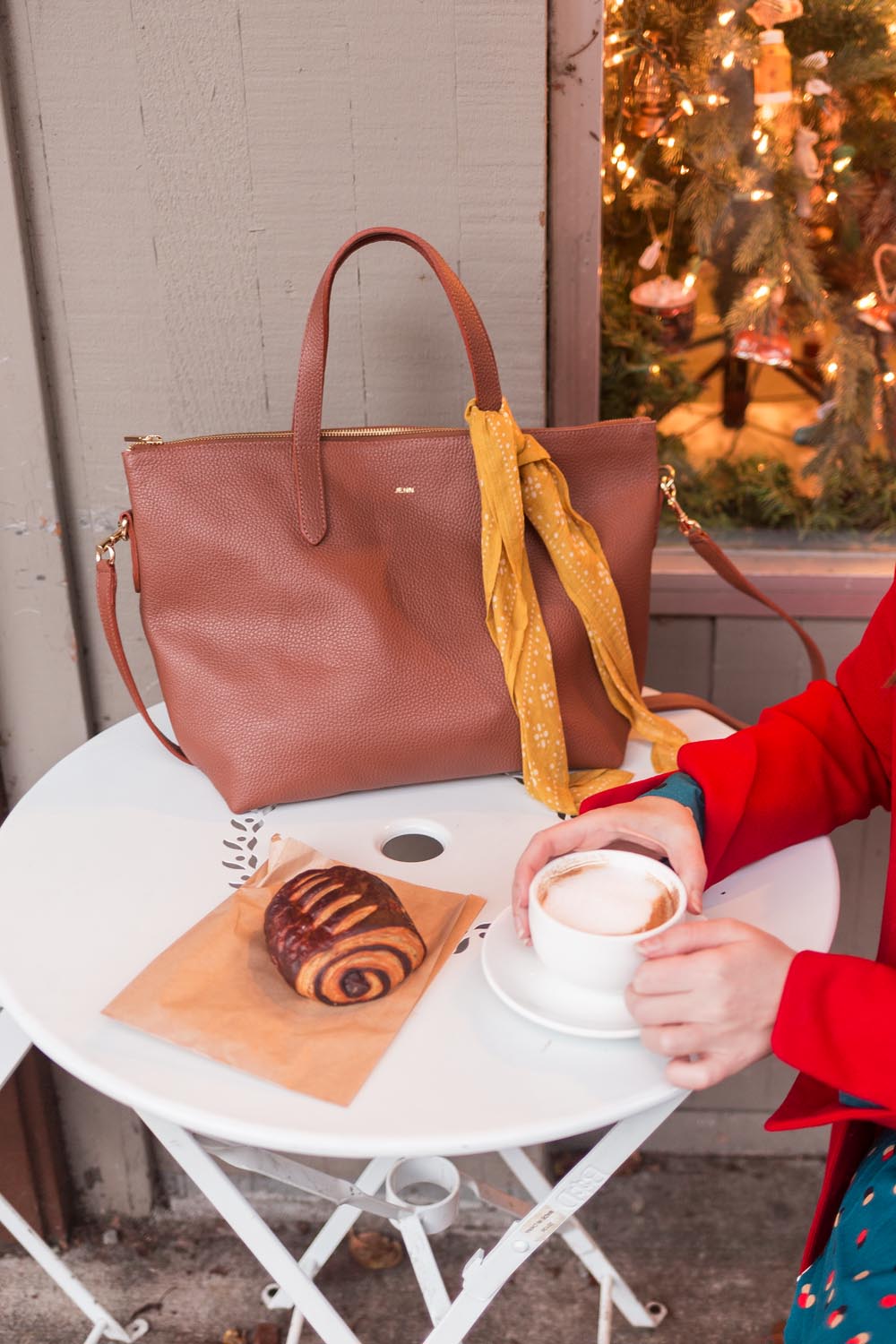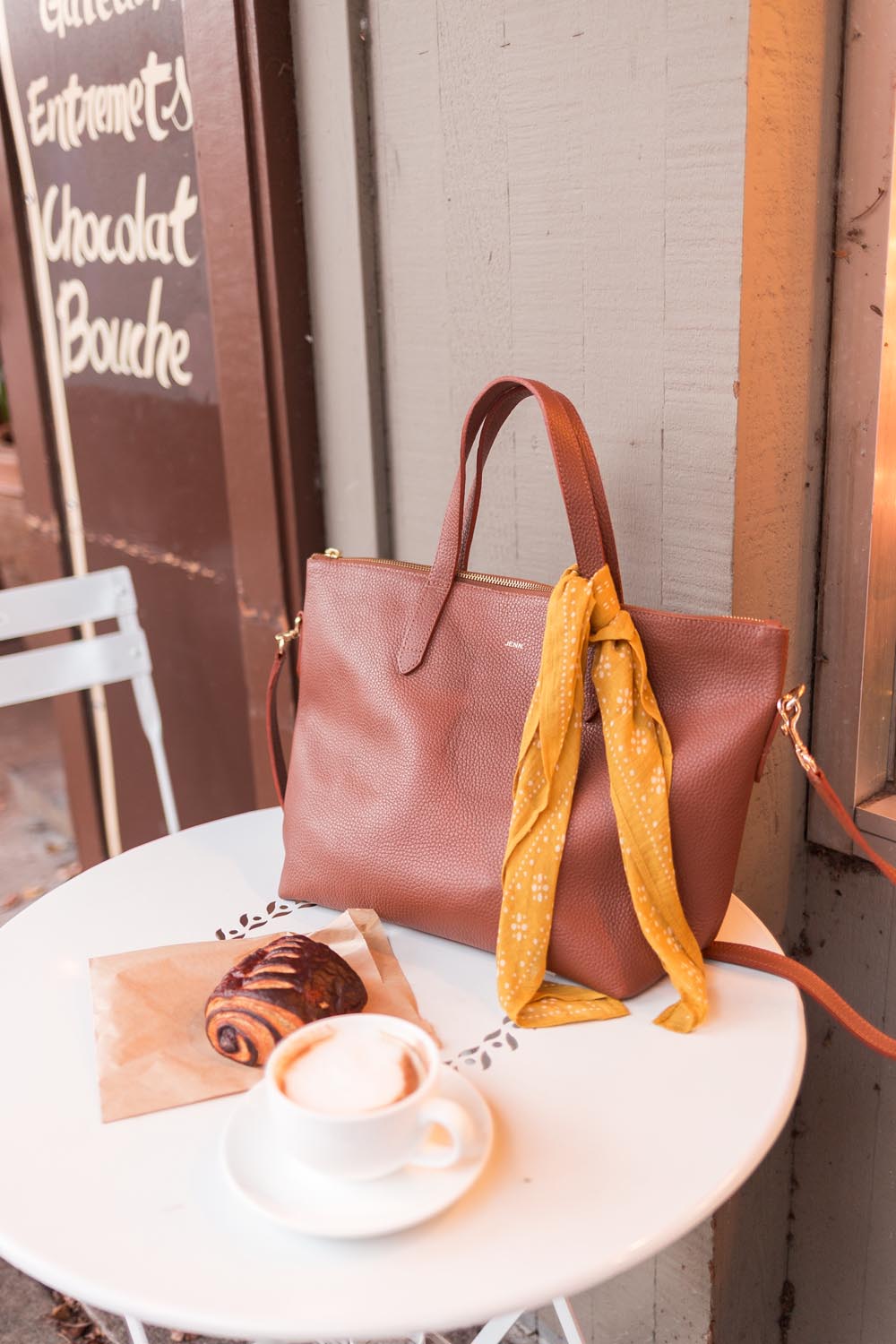Quitting your job to become a full time blogger sounds really glamorous… that is unless the reason you’re in that position is that your job can’t pay you anymore.
Yep, that’s essentially the position I found myself in last year.
I hesitated writing about the situation I found myself in because it was embarrassing, it was weird, and I wasn’t sure what I should or shouldn’t share. But the fact of the matter is that it happened to me, it’s happened to other people, and what came out of it was probably for the best anyway. It forced me to decide whether or not I wanted to become a full-time freelancer. I had to choose if I wanted my blog business to be just that, or if I wanted to step back, find a new job, and go back to treating my blog more like a hobby that occasionally brings in a little extra spending money.

2018 was rough. It challenged me, it forced me to take leaps when I wasn’t necessarily ready for them, and it made me realize that I’m stronger than I give myself credit for. I won’t sugar coat it and pretend that some days my anxiety and stress levels were almost unbearable. Some days, I couldn’t write because I couldn’t get out of my own head about every what if under the sun.
But, fortunately, so far those “what if’s” haven’t materialized and all the time spent thinking about them? A total waste.
But honestly, this post isn’t about what happened to me. What happened to me could happen to anyone, whether you work for a startup like I did or you work for a big company. Employment is never a guarantee, and neither is the income I’m able to make from this blog. I learned that pointing fingers, rehashing the past, and “could have/should have/would haves” weren’t going to change anything.
What I want to share with you is that if you’re sitting around waiting for a sign, for a kick in the pants to do something different, then stop. If you want to be doing something different, do it. Don’t wait for destiny to smack you in the face and set you up with a new host of problems. Take a step, make a move, and just do it.
With that said, when I saw things beginning to go south at the office, I started taking steps to make blogging more sustainable for me. After all, as you know, we bought a house, so I have a mortgage to pay. Not to mention, there are house expenses every month to keep up with, and I enjoy a lifestyle that involves brunching on the weekend, travel every few months, and the occasional clothing splurge that I wanted to maintain.
Beyond sharing my story, I want to share with you 10 things I did to make blogging more realistic for me as a full-time income source. None of these things happened overnight; I’ve been blogging for over five years now, and many of these things are things I’ve learned after making mistakes, especially since I didn’t start this out with the intention to turn this into a business. I also credit past work experience that involved liaising with clients and executives in person, over email, and over the phone as being a massive help with my communication skills, ability to take constructive feedback, and not get taken advantage of. And I’d be remiss if I didn’t say that fellow bloggers and creatives have taught me A LOT and have been such a valuable wealth of information along the way.
With that said, here are some of the things I did as I began to transition myself from

10 Things I did Before I Quit My Job To Become a Full Time Blogger
1. I stopped talking down to myself and valued my work
I see a lot of bloggers (and creatives) doing this funny thing where they try to explain themselves out of getting paid. They look at who the brand has worked
2. I started saying no
When I stopped talking down to myself, started valuing my work, and I expected to get paid for that work, I began saying no. I’ve always said no when opportunities weren’t a fit for me, but now I say no even when the brand might be a great fit and even if the opportunity is paid.
Here are some instances I will still say no, despite how much I might love or want to work with the brand in question:
- They won’t match or come close to meeting my rate
- When they won’t pay me and offer a free product or service as payment, except in select instances such as travel, for supporting a small/new business, or when I would have had to purchase the product/service on my own already (and thus it is saving me money)
- When the project feels like more work than what I initially signed on for or the timeline is too tight for me to produce quality work
- When I have another project that conflicts because of exclusivity or timeline
- The brand changes the ask, and I’m no longer comfortable with the terms
- When the contract includes terms that I don’t agree with and aren’t open to negotiation, like copyright ownership of the content I create, or the ability to use my likeness in perpetuity (which means forever, by the way)
3. I stopped making excuses and quit negative self-talk
I think this is the number one reason bloggers and creatives fail to thrive. They make excuses for themselves, get trapped in a spiral with negative self-talk, and talk themselves right out of their value. This has got to stop. If you want to be successful, you need to be your biggest advocate, your own cheerleader, and you need to believe in yourself. Because honestly, if you don’t, no one else will.
Instead of criticizing my own photography skills or my writing, worrying about how many followers I don’t have, my engagement rate, or something else, I have learned that it’s better to work on self-improvement. When I’m not feeling great about my photography skills, I watch videos on YouTube from professional photographers I like, and I learn something new. When I feel like my writing is lacking, I take a break and try writing about something different, or change tasks to get my mind off of it.
When I start feeling bad that my Instagram growth has stagnated, I start planning a new concept for a shoot, spend time on my blog, or schedule a few posts out so that I can spend a bit less time on the platform. When I start looking around at others who have better numbers on their social posts than I do, I spend time on things like hashtag research, save photos that inspire me, or learn something new about the platform from someone who has had success.
You see what I’m doing here, right? I’m taking that negative self-talk and turning it into a growth and learning opportunity. The truth is, someone will always be better than you. It’s just the nature of the world. Instead, I encourage you to turn it around by asking yourself questions like these:
- How can I improve my own content?
- Am I actually missing out on anything by not being invited to this event/campaign/outing?
- If I want to work with this brand, am I willing to reach out to them on my own and pitch them a great idea?
- Is there something I can learn from this and apply to my own content?
Then, instead of spiraling into more negative self-talk, take action.

4. I set attainable goals for myself and my business
As I mentioned before, I first scaled back my hours at my previous job so that I could “test the waters” to see if I could make this work full-time. I set a goal that I would need to make the same or close to my previous salary as a blogger for three consecutive months before quitting. Fortunately, I was able to do that as I ended up being forced to leave my job anyway due to the whole lack of getting paid thing. Minor details. ;)
Beyond that, I also set an achievable dollar amount goal that I wanted to make by the end of 2018 on my blog. By the last month of 2018, I had nearly made double the initial target. By setting attainable goals for myself and my business, I was able to be pleasantly surprised about my income instead of constantly stressed and taking on too much to try to make something that was out of reach.
Beyond monetary goals, I also set myself up for success by working on reducing my schedule. I started cutting back on event attendance, and limit myself to 3 blog related events per week. (Previously, I’d go to an event per night, sometimes even multiple, if I had been invited.) I learned that by reducing my social commitments during the work week, I could get more done at home and feel like I actually could take a night off to watch Netflix for once.
5. I asked questions and for help when I needed it, and I listened
When I needed help or advice when it comes to blogging, I try to first research on my own, and if I can’t find the answer, I ask others for help. A great resource for bloggers are groups on Facebook. Just type in your blog niche + “bloggers” and tons of groups will come up. Most of these groups allow you to ask questions, share blog posts, get feedback, and more. It’s also a great way to make new friends!
The only thing you can do wrong when it comes to asking questions is not listening when you get answers, be appreciative for the help and pay it forward in the future. Listen, take action, and say thank you!
6. I made improvements to my blog
When it comes to blogging, learning and growing are key. I like to think I am always learning, and try to educate myself as often as I can so I can make my blog and business the best it can be. That’s not to say I never make mistakes or always do things the “right” way, but I do put in the time and effort to continuously be improving.
There are several tools I’ve adopted to make the blog the best it can be. I took the time to design a custom blog layout so that my website looks how I want it to and like no one else’s. When it comes to writing, I use Grammarly to make sure my spelling and grammar are correct. It goes above and beyond your standard spell checker by providing suggestions on how to improve your writing and even has settings dependent on the type of writing you are doing (creative, professional, academic, and more.) If you do a lot of writing assignments beyond blogging, there are helpful tools like a plagiarism detector, goal setting options, and you can also hire a real, live person to proofread for you.
I also spent time and money on photography classes to better learn to use my camera, and I pay for Adobe Creative Cloud so that I can edit my own photos with Photoshop and Lightroom. When it comes to creating photos, I also invested in things like props and tools to make my photos more dynamic and interesting to readers like you. You can find out more about how I take my own photos and some of the photography equipment I recommend here.

7. I followed up on email
Besides quitting the negative self-talk, the other biggest thing I credit to making blogging full-time work for me is the art of following up. Previously, I would receive inbound emails from brands for opportunities, and when I didn’t hear from them, I never did anything about it.
To fix this, first, I set up a system to track collaborations, whether they were in the works or I had a timeline in place. The second thing I did was I bought Boomerang for Gmail. This little email extension has been a total game changer. Now, I’m able to set reminders to follow up on emails I don’t receive a response from, schedule emails to go out at a more appropriate hour (I’m notorious for working on email late at night) and pause my inbox when I’m feeling overwhelmed by it.
With anything in life, persistence is key. Often, brands and marketers are also battling a busy inbox, and sometimes things just go unanswered. Just because a brand doesn’t get back to you doesn’t mean they don’t want to work together any longer. Sometimes projects change, people leave their roles, or they just plain forgot to respond. No matter the reason, a polite nudge on an unresponded email can do wonders. I personally don’t follow up more than three or four times, but I know some who follow up until they hear no.
8. I took contracts and agreements seriously
When you work with brands, legal contracts need to be drawn up so both parties are protected. You as the blogger need to ensure you will get paid and the brand will do what they say they will, and the brand needs to ensure that they receive their deliverables on time. Beyond that, contracts and agreements also outline the terms of use of the content you create and set expectations for the project as a whole.
As a blogger, this can be challenging. The majority of us are not lawyers and have minimal experience with reading legalese. The fact of the matter is that if you can’t afford to hire a lawyer to look over every contract (which would be ideal, but also expensive for a new business) then you need to be familiar with legal terminology, so you are not getting taken advantage of.
A few things I’d recommend watching out for:
- terms of use
- the term “perpetuity”
- how the brand wishes to use your likeness
- exclusivity
- work for hire, copyright, and content ownership
- who the contract is addressed to (you or your business)
Please be sure that before signing a contract, you are comfortable with the terms outlined in your agreement, and if you’re not, bring this up to your contact. More often than not, the brand rep or contact person has been willing to remove or edit the terms that I wasn’t comfortable with. And if you’re not comfortable, walk away. It sucks, but sometimes you just have to do it to protect yourself, your content, and your business.
9. I conducted myself professionally at all times
When it comes to interacting with others, treat every interaction like you are working with that person and as a potential business opportunity. Introduce yourself, be polite, interested, engaged, and professional. Whether you’re speaking with someone in person at an event, on the phone, or over email, be respectful of their time, ask relevant questions, and treat them as you would want to be treated.
When it comes to business communication, do your best to respond to inbound emails within 24-48 hours. I wish I could say that I am great at that, but the truth is that this is one of my weak points in my business. It’s easy to fall down a rabbit hole in your email inbox, and getting things in control can be difficult. A combination of Boomerang, setting priorities, and time blocking

10. I treated it like a business
Ultimately, the biggest thing I did to help make my business more sustainable was… well, to treat it like one. Blogging can be a very personal thing, and sometimes it’s easy to take things to heart. Treating it like a business (even if you’re not quite there yet) helps you draw clear lines in the sand about what you will and won’t tolerate. After all, for a business to work, it needs to be profitable. That means that sometimes you will need to say no to things that don’t pay, no matter how much you love the brand. Other times, you might need to say yes to projects you might not 100% be into. To this point, never take on projects for brands or products you wouldn’t recommend. It’s one thing to work on a project that isn’t super glamorous, and it’s another to lie to your audience.
Beyond taking on projects, it’s essential to get other aspects of your business in line. As a self-employed person, you will now be responsible for self-employment taxes if you live in the United States (sorry, I can’t speak for other countries, but you probably have some sort of different tax to pay, too). You’ll also need to start paying quarterly estimated taxes since you will no longer be receiving paychecks that have your taxes already taken out. Additionally, you’ll be responsible for acquiring your own health insurance. If your family or spouse is unable to add you on, check with your state for health insurance options, or look into joining a creative guild or union. Often, guilds offer their members discounted group rates on their health, vision, and dental insurance.
You can find creative guilds and unions for all sorts of professions, but here are a few to start:
- Graphic Artists Guild
- Writer’s Guild (PEN)
- Photographers Guild (PPA)
- Screen Actors Guild (SAG-AFTRA)
- Model Alliance
- Freelancers Union
When it comes time for you to determine whether or not you’re ready to leave your full-time job to blog, I hope these tips and suggestions will help you make your decision. Ultimately, it’s a personal one that is challenging, exciting, and a little scary. Beyond preparing yourself and your business, be sure you have the support of friends and family. Having someone to lean on when things get tough is such a huge help and relief!
I wish you luck in your journey, and if you ever need any help, I’m just an email away!
Have you considered leaving your job for a creative career? If you’ve already done it, how did you prepare yourself? Do you have any advice to share that I might have missed? I’d love to hear about it in the comments!


Yes! Yes to ALL of this! I left my job at the end of 2017 and even though I’m not a blogger, you’re SPOT ON with so much of this post. You really have to believe in yourself, see business opportunities in the every day, and learn as you go. Now I’m a freelance small business consultant while I work on my writing and creative endeavors and I love how often I can meld the two. The flexibility, autonomy, and true connection I get to have with my clients is really rewarding. There are still times when it is scary or when I have self-doubt, but I remember what the end game is and I roll with it. Congratulations!
Aw thanks so much, Kristan! I love that you’re pursuing your own path and combining your skills to offer amazing services to your clients. They’re so lucky to have you! :)
You are so right about not waiting around for the opportunity or a kick in the pants, I am so glad that you saw the writing on the wall at you former company and started securing your future blogging business. I hope it brings you many new opportunities in the new year!
Aw, thank you so much Nelle! I really appreciate it and look forward to what’s to come in 2019. :)
It is so true that you find opportunity, opportunity rarely finds you.
Yes, totally agree! And I think when you’re looking for it and ready it will often all fall into place. :)
This article was meant for me to see. I have blogged for others, written articles, advertisements, marketing campaigns, etc… for more years that I care to admit. I have thought about developing my own blog for 10 years now, always letting negative self-talk take over…”there are already too many blogs out there”….”what do I have to contribute that someone else isn’t already talking about”…and on and on. But lately I’ve gotten back on the bandwagon and am moving forward. In the last month I have received SO many “messages” that I would have never otherwise seen nor come to me on a normal day – I’m taking them all as signs that NOW is the time – what do I have to lose?! And maybe I do have something unique to say (clearly…as this reply is already too long LOL!). ANYHOOO, my question for you is: do you hire a photographer to take photos when you are the subject, or need to be in the picture? How does that work? THANK YOU!
Hi Peg! I’m so glad this was helpful. I totally know what you mean – I still struggle with self doubt and negative self talk all the time. Learning to turn it into something positive is hard but well worth it.
To answer your question about photography, I often take my own photos. I have a blog post about it here that might help you: https://www.hellorigby.com/how-to-take-your-own-outfit-photos-for-your-blog/ It helps my business be more sustainable since hiring a photographer adds up quick! To get photos out and about, I often meet up with blog friends and we exchange photos. I’ve also taught my SO how to take my photos as well. Hope that helps!
This is such a helpful post. I am wanting to get my blog going to be a full-time blogger once my daughter is in school. You touch on a lot of great points, but the believing in yourself really hits home. I have major imposter syndrome and as I transition into a lifestyle blog it’s been even worse. Thanks so very much for sharing!
I’m so glad to hear that, Rebecca! I still battle imposter syndrome often. Having a group of creative friends has really helped me when I’m feeling down on myself, and investing time into education and learning has kept me feeling like I *might* know what I’m doing sometimes. ;) Wishing you all the best!!